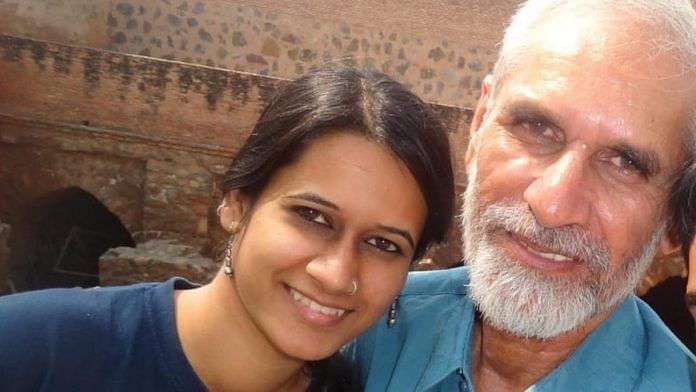New Delhi: The Delhi Police have opposed February riots accused Natasha Narwal’s request for a hard copy of the over 18,000-page charge sheet that was filed by its Special Cell against 15 people on 16 September.
Narwal is among the 15 accused named in the charge sheet submitted in FIR number 59/2020, that is being probed by the Special Cell. Like the other accused, she was also given an electronic version of the charge sheet.
In her application filed before Additional Sessions Judge (ASJ) Amitabh Rawat on 22 September, Narwal said several statements of witnesses and WhatsApp groups that were relied upon to make a case against her are not readable or in the OCR format. OCR is a technology that enables conversion of different types of documents into editable and searchable data.
She relied on a Supreme Court judgment of 2013, which, according to her, said that a physical copy of the charge sheet has to be given to an accused.
On Saturday (26 September), the Delhi Police said the Code of Criminal Procedure (CrPc) mandates supply of a charge sheet copy to an accused but does not say if it should be a hard or soft copy.
ASJ Rawat is likely to pronounce an order on Narwal’s application on 3 October.
Also read: Umar Khalid’s arrest shows the future of dissent in India only gets darker from here
Delhi Police cites Webster’s New World Dictionary
The Delhi Police said the term ‘copy’ was used in the CrPc when the law was formulated in 1898 and would be incorrect to read the language of the law in the light of “contemporaneous” times.
According to the police, it would be inappropriate for the accused to link the word ‘copy’ to the supply of a ‘photocopy’ because when the law was enforced for the first time in 1898 there were no photocopy machines.
The linking is not only incorrect, said the police, but would also mean qualifying the statutory provision which is impermissible.
To justify that a ‘soft copy’ is well within the meaning of the word ‘copy’ in the CrPc, the Delhi Police quoted from the Webster’s New World Dictionary.
The only requirement for a ‘copy’ is that it must be a “full reproduction of the original” and “should be accurate and true”, said the Delhi Police. A ‘soft copy’, it further said, is also acceptable in terms of the Information Technology Act, 2000 that recognises information provided to court in the electronic form.
On Narwal’s contention that the charge sheet was ineligible in parts, the police said she can approach the court for a replacement copy.
Narwal seeks OCR-searchable copy of WhatsApp groups
According to the charge sheet, Narwal is one of the key conspirators in the northeast Delhi riots, which, according to the police, were orchestrated to coincide with US President Donald Trump’s visit to India.
The riots were allegedly planned in the garb of a “chakka jam” with an intention to create discontent against the democratically-elected central government, the police’s report stated.
The police have relied heavily on WhatsApp communication among the alleged main conspirators of the riots, including JNU student Sharjeel Imam and its former student Umar Khalid. The police have also claimed that they were members of a WhatsApp group called the Delhi Protests Support Group.
The police have attached conversations of two WhatsApp groups belonging to the police department too. Narwal has asked for OCR-readable and searchable files of all these groups.
According to her application, the documents submitted along with the charge sheet, including statements of witnesses recorded on oath under section 164 of the CrPc, that runs into 662 pages, were not bookmarked and non-indexed.
Also read: CAA protesters’ arrest ‘designed to send chilling message’: UN asks India to free activists



